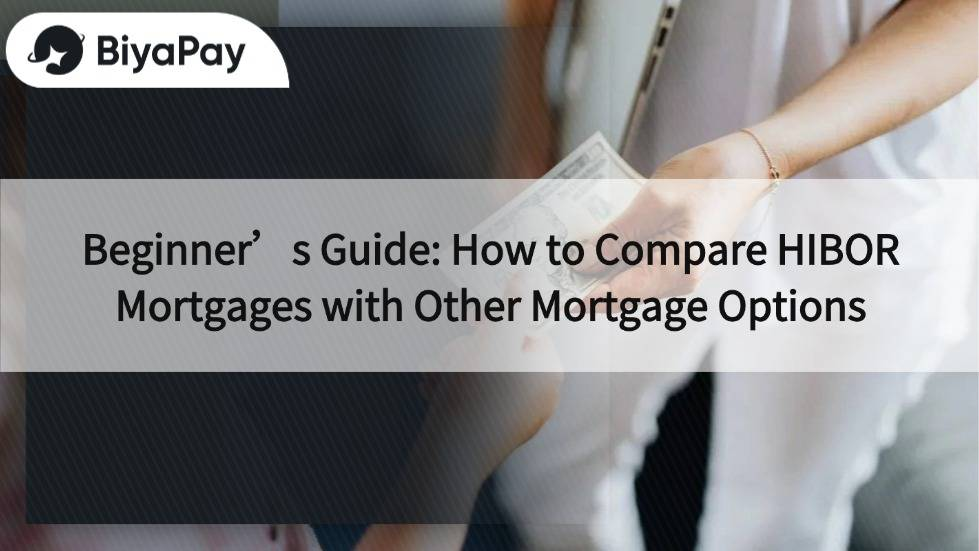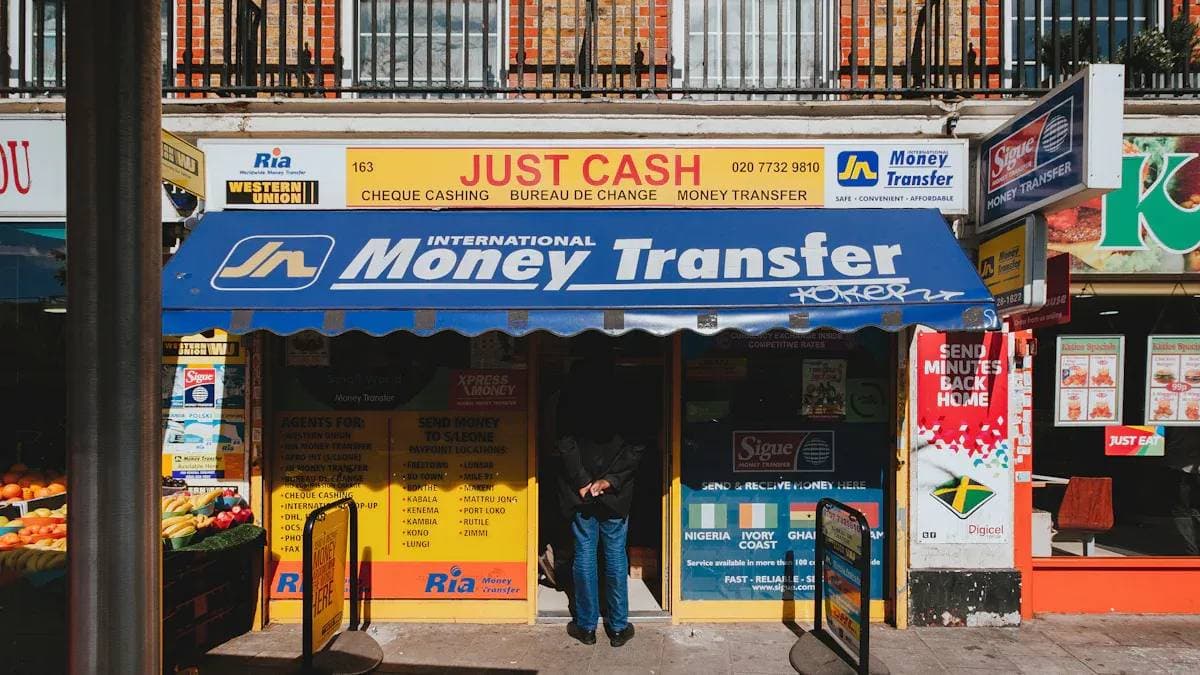- EasyCard
- Trade
- Help
- Announcement
- Academy
- SWIFT Code
- Iban Number
- Referral
- Customer Service
- Blog
- Creator
Beginner’s Guide: How to Compare HIBOR Mortgages with Other Mortgage Options

Image Source: pexels
If you plan to buy a property, the first step is to understand different mortgage options. HIBOR mortgages, Prime-based § mortgages, and fixed-rate mortgages each have their own characteristics. You need to compare Hong Kong HIBOR rates, banks’ prime rates, and fixed-rate options, as they affect your monthly payments. You should consider whether you can accept interest rate fluctuations, whether you need stable repayments, and your risk tolerance. To choose the right option, make a decision based on your financial situation and the duration of your property ownership plan.
Key Points
- HIBOR mortgage rates fluctuate with the market, leading to potentially significant changes in monthly payments, suitable for borrowers who can tolerate interest rate risks.
- P mortgages offer relatively stable rates and promotional periods, suitable for those who want to reduce the pressure of rate fluctuations but can accept rate increases after the promotional period.
- Fixed-rate mortgages have fixed interest rates, ensuring stable monthly payments, suitable for borrowers seeking long-term financial planning and avoiding interest rate risks.
- Before choosing a mortgage option, assess your personal financial situation, risk tolerance, and property ownership plan duration, and regularly monitor interest rate trends.
- When applying for a mortgage, prepare financial documents, pay attention to contract terms and refinancing costs, and avoid overlooking hidden fees and risks.
Overview of Mortgage Options
HIBOR Mortgage
When you choose a HIBOR mortgage, the bank calculates the interest rate based on the Hong Kong Interbank Offered Rate (HIBOR). This option has a floating interest rate, which adjusts with market changes. You should note that over the past 12 months, the average HIBOR mortgage rates of major banks fluctuated between 1.2% and 1.5%. If your monthly payment was originally USD 1,920 (approximately HKD 15,000, based on 1 USD = 7.8 HKD), after a rate increase, it could rise to USD 2,244 (approximately HKD 17,500). Experts predict that HIBOR may experience fluctuating upward trends in the next two years. You need to be mentally prepared, as interest rate fluctuations bring uncertainty.
| Item | Data/Description |
|---|---|
| Rate Fluctuation Range | Over the past 12 months, major banks’ HIBOR mortgage rates fluctuated on average between 1.2%–1.5% |
| Monthly Payment Change Example | Monthly payment increases from USD 1,920 to USD 2,244 |
| Market Trend Forecast | HIBOR may show a fluctuating upward trend in the next two years |
| Risk Warning | Interest rate fluctuations bring uncertainty, requiring proper risk management |
Analysts remind you that global economic recovery and inflationary pressures in 2025 may intensify HIBOR fluctuations. You should regularly review your financial situation and prepare early.
P Mortgage
A P mortgage is based on the bank’s Prime Rate. When you choose a P mortgage, the interest rate is determined by adding or subtracting a fixed percentage from the bank’s announced prime rate. This option has slower rate changes compared to HIBOR mortgages, offering more stable payments. If you want to reduce the pressure of interest rate fluctuations, you can consider a P mortgage. However, P mortgage rates are generally slightly higher than HIBOR mortgages.
Fixed-Rate Mortgage
A fixed-rate mortgage offers a fixed interest rate for a specified period. Your monthly payment amount remains unchanged despite market interest rate fluctuations. This option is suitable if you seek payment stability and want to avoid the risks of rising interest rates. After the fixed-rate period, the rate becomes floating. You should note that fixed-rate mortgage rates are usually higher than floating-rate options but provide greater budget stability.
Comparison of Hong Kong HIBOR Rates and Mortgage Rates

Image Source: pexels
Characteristics of Hong Kong HIBOR Rates
When you choose a HIBOR mortgage, Hong Kong HIBOR rates directly affect your payments. This rate reflects the cost of borrowing among Hong Kong banks. You can understand the characteristics of Hong Kong HIBOR rates from the following points:
- Hong Kong HIBOR rates reflect the market’s funding costs and interbank borrowing conditions.
- Rates fluctuate with market supply and demand, economic conditions, and international monetary policies.
- HIBOR mortgage rates are periodically adjusted based on Hong Kong HIBOR rates, causing your monthly payments to change at any time.
- In 2025, global economic recovery and inflationary pressures have intensified HIBOR rate fluctuations, with major banks’ HIBOR mortgage rates fluctuating on average between 1.2%–1.5% over the past 12 months.
- When market rates rise, your monthly payment may increase from USD 1,920 (approximately HKD 15,000, based on 1 USD = 7.8 HKD) to USD 2,244 (approximately HKD 17,500).
Tip: Changes in Hong Kong HIBOR rates can instantly reflect market conditions, helping you understand the economic environment and risks.
Interest Rate Fluctuations and Rate Caps
When you choose a HIBOR mortgage, you need to pay close attention to interest rate fluctuations and rate caps. HIBOR mortgages have floating rates, with banks adding a margin (e.g., HIBOR + 1.3%) to the HIBOR rate. This rate adjusts with market changes, causing your payment amounts to vary.
- Banks typically set a rate cap to protect you from excessive interest costs during sharp rate increases. For example, if the cap is set at 3.5%, your effective rate will not exceed this level even if HIBOR rises significantly.
- You should carefully read the mortgage terms to understand the margin and rate cap settings.
- HIBOR mortgages are suitable for borrowers who can tolerate interest rate fluctuations. If you seek payment stability, this option may not be the best fit.
You should also note that some banks offer fixed-rate or locked-rate promotions for the first year, reducing initial payment pressure. After the promotional period, the rate reverts to floating.
Comparison of P Mortgage and Fixed-Rate Mortgage
If you want to compare P mortgages and fixed-rate mortgages, refer to the table below:
| Mortgage Option | Payment Adjustment Frequency | Rate Fluctuation Range | Monthly Payment Change Example | Risks and Characteristics |
|---|---|---|---|---|
| HIBOR Mortgage (H Mortgage) | High-frequency adjustments, follows HIBOR changes | Fluctuated by about 1.2%–1.5% over the past 12 months | Increases from USD 1,920 to USD 2,244 | Large payment fluctuations, higher risk |
| Prime Rate Mortgage (P Mortgage) | Low adjustment frequency, typically 3–5 year promotional period | Promotional period rate around 2.8%, rising to about 3.8% afterward | Monthly payment increases by about 15% | Stable during promotional period, risk of rate increase afterward, consider refinancing |
| Fixed-Rate Mortgage | No adjustments, fixed rate | Fixed throughout the term | Monthly payment remains stable | Locked repayment costs, suitable for those seeking stability |
You can see that P mortgages offer promotional rates for the first 3–5 years, resulting in lower monthly payments. After the promotional period, rates increase, raising payments by about 15%. Some property owners consider refinancing before the promotional period ends to reduce payment pressure. Fixed-rate mortgages have fixed rates throughout, with unchanging payments, suitable for those wanting long-term financial planning and avoiding market rate risks.
Note: P mortgages attract first-time buyers and those refinancing, but the risk of rate increases after the promotional period is higher. Fixed-rate mortgages are suitable for risk-averse individuals and those holding properties long-term.
When choosing a mortgage option, you should base your decision on your tolerance for interest rate fluctuations, financial situation, and property ownership plan duration. The volatility of Hong Kong HIBOR rates has increased significantly in recent years, and banks and financial institutions have introduced more risk management measures. You should regularly review your mortgage arrangements and make adjustments early.
Risks and Suitable Borrowers
Interest Rate Fluctuation Risks
When you choose a HIBOR mortgage, the biggest risk to note is the impact of interest rate fluctuations. HIBOR mortgages have floating rates, and when market rates rise, your payment amounts increase. For example, if your monthly payment is USD 1,500 (approximately HKD 11,700, based on 1 USD = 7.8 HKD), a 1% HIBOR increase could raise it to USD 1,650 (approximately HKD 12,870). This change affects your monthly budget. If your income is unstable or you face significant financial pressure, rate fluctuations can make managing expenses more difficult.
Tip: You can regularly monitor HIBOR trends published by Hong Kong banks and adjust your financial plan early to reduce pressure from sudden rate increases.
P mortgages and fixed-rate mortgages have less interest rate fluctuation. P mortgages are relatively stable during the promotional period but may rise afterward. Fixed-rate mortgages have fully fixed rates, offering the most stable payments, suitable for those wanting to avoid interest rate risks.
Suitable Borrowers
Different mortgage options suit different types of borrowers. Refer to the list below:
- If you can tolerate interest rate fluctuations and seek lower rates, a HIBOR mortgage may suit you.
- If you value payment stability and don’t want sudden rate spikes, a P mortgage may be more suitable.
- If you prioritize fixed repayment amounts and long-term financial planning, a fixed-rate mortgage is the best fit.
| Mortgage Option | Suitable Borrower | Main Characteristics |
|---|---|---|
| HIBOR Mortgage | Can tolerate fluctuations, seeks low rates | Floating rates, unstable monthly payments |
| P Mortgage | Needs some stability, accepts adjustments after promotional period | Stable during promotional period, may rise afterward |
| Fixed-Rate Mortgage | Seeks long-term stability, budget planning | Fixed rates throughout, unchanged payments |
When choosing, base your decision on your income stability, risk tolerance, and property ownership plan duration. If unsure, consult professional advice from Hong Kong banks to ensure you select the most suitable option.
Option Comparison
Main Differences
When choosing a mortgage option, you’ll find significant differences in risk, attitude, and purchase intention among different options. According to statistical data, these differences are closely related to your gender, education, age, family status, and monthly household income. Refer to the following key points:
- Different options have significant differences in perceived risk, attitude, and purchase intention.
- Education, family status, and monthly income affect your perception of risk.
- Gender, age, and income influence your emphasis on mortgage promotions.
- Family status and income affect your attitude and purchase intention toward options.
- When you perceive lower risk or attractive promotions, you’re more likely to choose that option.
You can choose the most suitable mortgage option based on your background and needs.
Repayment Flexibility
Repayment flexibility is an important consideration when choosing a mortgage. HIBOR mortgages typically offer higher flexibility, with some Hong Kong banks providing options for early repayment or refinancing with lower penalties. P mortgages have moderate flexibility, while fixed-rate mortgages, due to their fixed rates, have lower flexibility. If you anticipate early repayment or refinancing in the future, pay special attention to related terms.
| Option | Repayment Flexibility | Remarks |
|---|---|---|
| HIBOR Mortgage | Higher | Early repayment possible, lower penalties |
| P Mortgage | Moderate | Consider refinancing after promotional period |
| Fixed-Rate Mortgage | Lower | Early repayment often incurs higher penalties |
Tip: Carefully read contract terms to understand repayment flexibility and related fees to avoid unnecessary expenses later.
Promotional Period
When choosing a P mortgage or HIBOR mortgage, there’s usually a promotional period for the first year or first three to five years. During this period, banks offer lower rates to reduce initial payment pressure. Fixed-rate mortgages focus on fixed rates throughout, with no additional promotional period. Choose the promotional period length that best suits your financial planning.
- HIBOR Mortgage: Often includes first-year fixed-rate or locked-rate promotions.
- P Mortgage: Typically has a three-to-five-year promotional period, with rates rising afterward.
- Fixed-Rate Mortgage: Fixed throughout, no additional promotional period.
If you prioritize lower initial payments, consider options with promotional periods. If you seek long-term stability, a fixed-rate mortgage is more suitable.
Scenario Examples

Image Source: pexels
Low-Interest Seekers
If you prioritize minimizing interest expenses and want the lowest possible monthly payments, a HIBOR mortgage may be the best fit. HIBOR mortgage rates are generally lower than P mortgages and fixed-rate mortgages. You can benefit from lower interest rates when market rates fall. For example, if you choose a HIBOR mortgage from a Hong Kong bank with a rate of HIBOR + 1.3%, when HIBOR is 1.2%, the effective rate is 2.5%. If you borrow USD 400,000 (approximately HKD 3,120,000, based on 1 USD = 7.8 HKD), your monthly payments will be lower than with P or fixed-rate options.
Tip: Regularly monitor HIBOR trends, as rates may rise, increasing monthly payments. You need some risk tolerance.
Stable Payment Needs
If you have stable income and a budgeted household expenditure, fearing sudden payment increases, a fixed-rate mortgage is more suitable. Fixed-rate mortgages offer a fixed rate for a specified period, allowing you to predict monthly payments without worrying about market rate fluctuations. For example, if you choose a fixed-rate mortgage from a Hong Kong bank at 3.2% for a USD 400,000 loan, your monthly payments remain constant regardless of market rate changes.
- Suitable for: Those needing long-term financial planning
- Main Advantage: Fixed repayment amounts, no sudden pressure
Note: Fixed-rate mortgage rates are usually higher than HIBOR mortgages, but you gain greater budget stability.
Short-Term Property Ownership Plans
If you plan to sell the property or refinance within a short period (e.g., three to five years), a P mortgage may be more suitable. P mortgages typically have a three-to-five-year promotional period with lower rates. You can enjoy lower monthly payments during this period. For example, if you choose a P mortgage from a Hong Kong bank with a 2.8% rate for the first three years on a USD 400,000 loan, your payments are lower. If you plan to sell or refinance before the promotional period ends, you won’t be affected by post-promotional rate increases.
| Option | Suitable Scenario | Main Advantages |
|---|---|---|
| HIBOR Mortgage | Low-interest pursuit | Lower rates |
| Fixed-Rate Mortgage | Stable payment needs | Fixed monthly payments |
| P Mortgage | Short-term property ownership plans | Lower rates during promotional period |
Tip: Note that P mortgage rates rise after the promotional period, and if you can’t refinance in time, payment pressure may increase.
Selection Tips
Choose Based on Your Situation
When choosing a mortgage option, first understand your financial situation and risk tolerance. Different options suit different needs. Refer to the table below:
| Option | Suitable Borrower | Main Characteristics |
|---|---|---|
| HIBOR Mortgage | Seeks low rates, can tolerate fluctuations | Rates fluctuate with Hong Kong HIBOR |
| P Mortgage | Values initial promotions | Rates may rise after promotional period |
| Fixed-Rate Mortgage | Seeks stable repayments | Fixed rates throughout, unchanged payments |
When comparing HIBOR mortgages from different banks, besides rates, pay attention to rate caps, margins, and promotional period terms. You should regularly monitor Hong Kong HIBOR rate trends and adjust your financial plan early.
Application Considerations
When applying for a mortgage, prepare the following:
- Assess your financial situation to ensure sufficient reserves to handle rate fluctuations.
- Maintain a good credit record to increase approval chances.
- Use online platforms to compare different bank products to find the most suitable option.
- Consult professionals to understand the latest market information.
- Compare options and reserve room for payment fluctuations.
For example, when Xiao Ming bought his first property and chose a HIBOR mortgage, he initially enjoyed low rates, but later faced increased payments due to rising HIBOR rates. He considered refinancing to a P mortgage, but processing and appraisal fees increased his burden. This reminds you to consider medium- and long-term risks and costs.
Avoiding Common Pitfalls
When choosing and applying for a mortgage, watch out for these pitfalls:
- Focusing only on rates, ignoring rate caps, margins, and promotional period terms.
- Overlooking refinancing fees and appraisal costs, leading to extra expenses.
- Failing to regularly monitor market changes, missing adjustment opportunities.
- Ignoring your repayment capacity, leading to financial pressure.
Suggestion: Regularly review your mortgage arrangements, stay informed about Hong Kong HIBOR rates and market trends, and make adjustments early to reduce risks.
When choosing a mortgage option, remember three key points: interest rate fluctuations, repayment stability, and personal financial situation. You should conduct thorough research and rationally compare different options. Regularly review your mortgage arrangements and monitor Hong Kong HIBOR rate trends. If in doubt, consult professionals.
FAQ
What are the main risks of a HIBOR mortgage?
You should note that HIBOR mortgage rates fluctuate with the market. When Hong Kong HIBOR rates rise, your monthly payments increase. You need sufficient reserves to handle fluctuations.
What’s the difference between a P mortgage and a HIBOR mortgage?
P mortgage rates are adjusted based on the bank’s prime rate, with slower changes. HIBOR mortgage rates fluctuate instantly with the market, with greater volatility. Choose based on your risk tolerance.
Who is a fixed-rate mortgage suitable for?
If you seek stable payments and have a clear income budget, a fixed-rate mortgage is the best fit. You can avoid payment pressure from rising market rates.
What documents are needed for a mortgage application?
You need to prepare identification, income proof, address proof, and bank statements. It’s best to organize documents in advance to speed up the application process.
Can I refinance to another option at any time?
You can refinance, but pay attention to contract terms and penalties. Some Hong Kong banks charge processing fees. Calculate refinancing costs before deciding.
Selecting between HIBOR, P-prime, or fixed-rate mortgages requires weighing rate fluctuations against financial stability, but constant rate monitoring and bank comparisons can overwhelm new buyers. BiyaPay streamlines your mortgage fund management with transfer fees as low as 0.5% and real-time exchange rate queries for transparent costs, eliminating tedious bank comparisons.
Supporting multiple fiat and digital currency conversions with swift registration, its 5.48% annualized yield wealth product offers flexible withdrawals to manage refinancing or repayments. Regulated internationally, it ensures secure transactions. Visit BiyaPay today to enhance your mortgage financial strategy and achieve your homeownership goals!
*This article is provided for general information purposes and does not constitute legal, tax or other professional advice from BiyaPay or its subsidiaries and its affiliates, and it is not intended as a substitute for obtaining advice from a financial advisor or any other professional.
We make no representations, warranties or warranties, express or implied, as to the accuracy, completeness or timeliness of the contents of this publication.




Contact Us
Company and Team
BiyaPay Products
Customer Services
is a broker-dealer registered with the U.S. Securities and Exchange Commission (SEC) (No.: 802-127417), member of the Financial Industry Regulatory Authority (FINRA) (CRD: 325027), member of the Securities Investor Protection Corporation (SIPC), and regulated by FINRA and SEC.
registered with the US Financial Crimes Enforcement Network (FinCEN), as a Money Services Business (MSB), registration number: 31000218637349, and regulated by FinCEN.
registered as Financial Service Provider (FSP number: FSP1007221) in New Zealand, and is a member of the Financial Dispute Resolution Scheme, a New Zealand independent dispute resolution service provider.




















